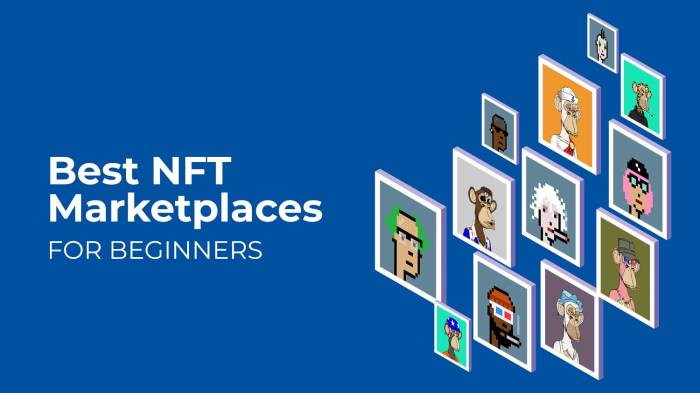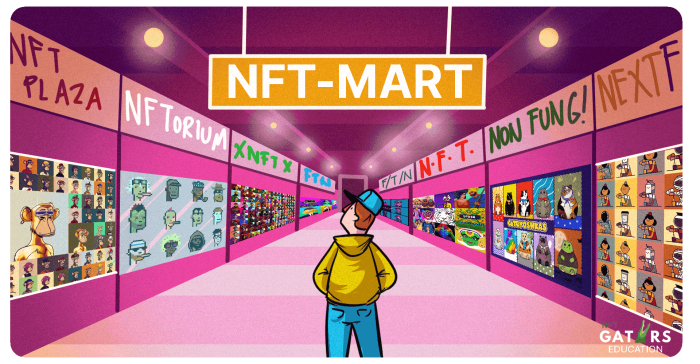NFT marketplaces have taken the digital world by storm, revolutionizing how we buy, sell, and trade unique digital assets. From the basics to the complexities, let’s dive into the world of NFT marketplaces and uncover the latest trends and opportunities awaiting us.
Overview of NFT Marketplaces

NFT marketplaces are online platforms where users can buy, sell, and trade non-fungible tokens (NFTs). These marketplaces operate on blockchain technology, allowing for secure transactions and ownership verification.
Concept of NFTs
Non-fungible tokens (NFTs) are unique digital assets that represent ownership of a specific item or piece of content, such as art, music, videos, collectibles, and more. Each NFT has a distinct value and cannot be replicated or exchanged like-for-like, unlike cryptocurrencies.
Popular NFT Marketplaces
- OpenSea: One of the largest NFT marketplaces, offering a wide range of digital assets for sale.
- Rarible: Known for its user-friendly interface and support for creators to mint and sell their NFTs.
- Foundation: A curated platform focused on showcasing high-quality digital art and collectibles.
- Sorare: Specializes in NFTs for fantasy football trading cards, attracting sports enthusiasts and collectors.
Types of NFT Marketplaces
When it comes to NFT marketplaces, there are different types that cater to various needs and preferences of both creators and collectors.
Primary vs. Secondary NFT Marketplaces
Primary NFT marketplaces are platforms where creators mint and sell their NFTs for the first time. These transactions are often directly between the creator and the buyer, cutting out any intermediaries. On the other hand, secondary NFT marketplaces are platforms where users can buy and sell previously minted NFTs. These transactions involve reselling or trading NFTs that have already been created and sold in primary marketplaces.
Curated vs. Open NFT Marketplaces
Curated NFT marketplaces are platforms that carefully select which NFTs are allowed to be listed on their platform. This curation process ensures a certain level of quality and authenticity in the NFTs available for purchase. In contrast, open NFT marketplaces allow anyone to mint and list their NFTs for sale without any curation process. This freedom can lead to a wider variety of NFTs but may also result in a higher risk of scams or low-quality artwork.
Role of Decentralized NFT Marketplaces
Decentralized NFT marketplaces operate on blockchain technology, enabling peer-to-peer transactions without the need for a central authority. These platforms offer increased security, transparency, and ownership rights to users. Decentralized NFT marketplaces also promote the ethos of decentralization and empower creators and collectors by giving them more control over their digital assets.
Features and Functionality: NFT Marketplaces
When it comes to NFT marketplaces, there are several key features that set them apart from traditional markets. These unique aspects play a crucial role in the buying, selling, and trading of non-fungible tokens.
Verification and Ownership Transfer Process
One of the standout features of NFT marketplaces is the verification and ownership transfer process. Each NFT is stored on a blockchain, which acts as a digital ledger that records all transactions. This ensures the authenticity and provenance of each token, providing buyers with a sense of security and trust in the marketplace.
Role of Smart Contracts
Smart contracts play a vital role in ensuring transparency and security within NFT marketplaces. These self-executing contracts are coded with specific instructions that automatically execute when certain conditions are met. This eliminates the need for third-party intermediaries, streamlining the transaction process and reducing the risk of fraud or manipulation.
Popular NFT Marketplaces

When it comes to NFT marketplaces, there are several platforms that stand out in terms of trading volume, user experience, and fees. Let’s take a closer look at some of the most popular NFT marketplaces in the industry.
Top NFT Marketplaces by Trading Volume
- OpenSea: Known as one of the largest NFT marketplaces, OpenSea boasts a high trading volume and a wide variety of digital collectibles and artworks.
- Rarible: Another popular platform, Rarible allows creators to mint and sell their NFTs easily, contributing to its significant trading volume.
- Foundation: With a curated selection of high-quality NFTs, Foundation attracts a niche audience and commands a notable trading volume in the marketplace.
User Experience Across Different NFT Marketplaces
- OpenSea: User-friendly interface, easy navigation, and a vast selection of NFTs contribute to a positive user experience on OpenSea.
- Rarible: The platform offers a seamless minting process for creators and a straightforward buying experience for collectors, enhancing user satisfaction.
- Nifty Gateway: Known for its focus on high-profile artists and exclusive drops, Nifty Gateway provides a premium user experience for NFT enthusiasts.
Fee Structure of Various NFT Platforms
- OpenSea: Charges a 2.5% fee on primary sales and a 2.5% fee on secondary sales, making it a cost-effective option for buying and selling NFTs.
- Rarible: Users on Rarible pay a 2.5% fee on all transactions, which is competitive compared to other platforms in the market.
- Foundation: With a 10% fee on primary sales and a 15% fee on secondary sales, Foundation’s fee structure is on the higher end but reflects its focus on quality curation.